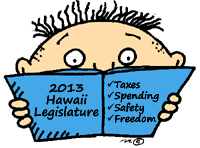What happened in the 2013 Hawaii legislature, part 1
In 2013, 276 bills became law in Hawaii, and an additional 12 bills became law without Governor Neil Abercrombie’s signature.
I skimmed through the 2013 legislation summaries and highlighted the laws that I think are important and will impact us all. If I’ve missed any significant or costly laws (in terms of spending or freedoms), please let me know!
Best 2013 Hawaii bill for government innovation: In my opinion, the best bill of 2013 is Act 155, which establishes a pilot program to generate revenue through the lease of public school lands for public purposes. Instead of raising taxes or cutting services, this bill looks for ways to earn revenue from existing government resources. Not only could leasing public school lands generate revenue, it could ensure better maintenance of school grounds and could discourage vandalism and graffiti during school breaks.
Best 2013 Hawaii bill for public safety: A close runner-up would be Act 213, which requires the Department of Health to post on its website reports of all inspections at state-licensed care facilities occurring on or after January 1, 2015. With our aging population, it is important to find out which health care facilities meet safety and care standards.
Trade-offs between public safety and personal freedom:
* Seatbelts required: All front and back seat passengers must wear a seatbelt (Act 73). Adults should be responsible for their own safety.
* Hawaii driver’s licenses scanning: Businesses may scan your driver’s license or Hawaii ID to verify your age when providing age-restricted goods or services (Act 195). Will our personal information (name, address, date of birth, and license or ID number) be secure?
* Hawaii Homeland Security established: Hawaii now has a State Office of Homeland Security within the State Department of Defense (Act 175). How much effort are we duplicating with our Civil Defense department? Why do their responsibilities include “foster coordination on security matters with all nations of the Pacific region”?
Bigger government:
* More task forces and advisory boards: We have the newly-created Hawaii Refinery Task Force (Act 78), the Hawaii Agriculture Workforce Advisory Board (Act 99), and the Hawaii Employer-Union Health Benefits Trust Fund (EUTF) Task Force (Act 268). I’m sure many more task forces and advisory boards were created. Do we need them? How much will they cost?
* More government oversight over occupational licensing: Advanced practice registered nurses must now have a graduate degree in nursing (Act 19). Licensed social workers must now complete minimum credit hours of continuing education courses for upcoming licensing renewal periods (Act 183). Does government have the authority and expertise to set occupational licensing requirements? Shouldn’t they be set by state or national occupational boards?
* More regulations on honey: Regulates the amount of honey that can be sold without a Department of Health permit, specifies honey labeling, and requires honey producers to take food safety classes (Act 131). Shouldn’t this be covered by food safety laws? It seems like micro-management or targeting of small honey producers.
* More power over conservation land under harbors: The Department of Transportation, Harbors Division, is now exempt from the permit and site plan approval requirements established for (submerged) lands within the conservation district (Act 86). The bill did not contain enough information to evaluate this exemption, but shouldn’t construction on public lands be permitted and open to public input?
More government spending:
* Higher spending for State retiree health plans: We increased the State’s base monthly contributions for retired Hawaii state and county employee health care plans, in some cases 33% to over 100% (Act 282). For example, the contribution for each employee-beneficiary enrolled in supplemental Medicare self plans increases from $254 to $524.73; the contribution for each employee-beneficiary enrolled in supplemental Medicare two-party plans increases from $787 to $1,051.71; and the contribution for each employee-beneficiary enrolled in supplemental Medicare family plans increases from $412 to $1,531.78. Have we budged for the increase? How has the Affordable Care Act affected these contribution rates?
* $500,000 for commemorative art: We will spend $250,000 over two years to commission permanent works of art to honor the late US Senator Daniel K. Inouye and the late US Representative Patsy T. Mink (Act 281). Could this be done through a non-profit foundation instead?
* More public assistance: We have eliminated the asset limit for households with children (previously, $5,000 and one motor vehicle) for the Temporary Assistance for Needy Families program (Act 18). There is not enough information in this bill for me to comment. Asset limits may encourage people to spend money (instead of save it), but removing the asset limit entirely may not encourage people to save money and may make fraud easier.
How would you rate our Hawaii legislature? What do you think are their best accomplishments and most misguided undertakings in 2013? What do you expect from our Hawaii legislature when the 2014 session begins tomorrow on January 15?
Explore posts in the same categories: GovernmentTags: 2013 Hawaii Legislature
You can comment below, or link to this permanent URL from your own site.
Leave a comment